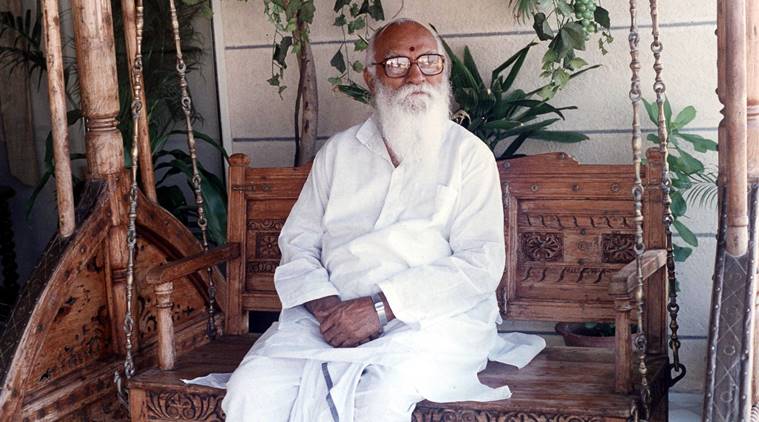Know more about Modern Chanakya Nanaji Deshmukh
Nanaji Deshmukh, whose full name was Chandikadas Amritrao Deshmukh, was a prominent Indian social activist, politician, and a key figure in the Rashtriya Swayamsevak Sangh (RSS)

Nanaji Deshmukh, whose full name was Chandikadas Amritrao Deshmukh, was a prominent Indian social activist, politician, and a key figure in the Rashtriya Swayamsevak Sangh (RSS). He played a pivotal role in various social and political initiatives aimed at rural development, education, and community welfare. Here's an overview of Nanaji Deshmukh's life and contributions:
Early Life of Nanaji Deshmukh
Nanaji Deshmukh, whose full name was Chandikadas Amritrao Deshmukh, was born on October 11, 1916, in the small village of Kadoli, located in the Parbhani district of Maharashtra, India. His early life and upbringing laid the foundation for his later commitment to social service and rural development.
- Rural Roots: Nanaji Deshmukh was born into a humble and traditional agrarian family in Kadoli. His early experiences in the rural setting deeply influenced his perspective on the challenges faced by rural communities.
- Educational Journey: Despite the financial constraints of his family, Nanaji Deshmukh exhibited a keen interest in education from a young age. He pursued his early education in the local village school and demonstrated exceptional academic capabilities.
- Early Social Service: Nanaji's inclination towards social service became apparent in his youth. He actively participated in community activities and strived to address the socio-economic issues prevalent in the rural areas of Maharashtra.
- Association with RSS: Nanaji Deshmukh's introduction to the Rashtriya Swayamsevak Sangh (RSS) happened during his early years. The RSS, a nationalist organization, became a significant influence on his life and played a crucial role in shaping his commitment to social and cultural causes.
- Work during the Partition: The tumultuous period of India's partition in 1947 saw Nanaji Deshmukh actively involved in relief and rehabilitation work. He worked tirelessly to assist and resettle refugees who were displaced during the partition, showcasing his dedication to humanitarian causes.
- Integral Humanism Influence: Nanaji Deshmukh was deeply influenced by the philosophy of Integral Humanism, propounded by Pandit Deendayal Upadhyaya. This philosophy, which emphasizes the holistic development of individuals and society, became a guiding principle in Nanaji's approach to social and political issues.
- Move to North India: In the early 1950s, Nanaji Deshmukh shifted to the northern part of India, particularly to the Chitrakoot region in Uttar Pradesh. This marked a significant phase in his life as he became more deeply involved in rural development initiatives.
- Founding Deendayal Research Institute: Nanaji Deshmukh founded the Deendayal Research Institute (DRI) in Chitrakoot, Uttar Pradesh. The institute became a platform for implementing various developmental projects and research activities aimed at uplifting rural communities.
Nanaji Deshmukh's early life experiences, coupled with his association with organizations like the RSS and his commitment to Integral Humanism, shaped his path towards a life dedicated to social service and nation-building. His journey from the rural landscapes of Maharashtra to becoming a prominent figure in national politics and rural development exemplifies his resilience, vision, and unwavering dedication to the well-being of society.
Association with Rashtriya Swayamsevak Sangh (RSS)
Nanaji Deshmukh had a significant and longstanding association with the Rashtriya Swayamsevak Sangh (RSS), a prominent Hindu nationalist organization in India. His involvement with the RSS played a crucial role in shaping his worldview, values, and his commitment to social service and nation-building.
- Early Affiliation: Nanaji Deshmukh's association with the RSS dates back to his early years. The RSS, founded in 1925 by Keshav Baliram Hedgewar, aimed to promote the idea of a strong, united, and culturally vibrant India.
- Philosophical Alignment: The RSS follows a nationalist and cultural ideology that emphasizes the importance of preserving India's cultural heritage, promoting social cohesion, and fostering a sense of national pride. Nanaji Deshmukh found resonance with these principles and became an active participant in the organization's activities.
- Sangh Pracharak: Nanaji Deshmukh dedicated a significant part of his life as a "Sangh Pracharak," which means a full-time worker or propagator of the RSS ideology. As a Sangh Pracharak, he engaged in grassroots work, propagating the values of discipline, cultural pride, and social service.
- Integral Humanism Influence: During his association with the RSS, Nanaji Deshmukh was influenced by the philosophical tenets of Integral Humanism, a socio-political philosophy propounded by Deendayal Upadhyaya, a prominent leader associated with the RSS. Integral Humanism emphasizes the holistic development of individuals and society, advocating for a balance between material progress and spiritual values.
- Community Service and Social Harmony: The RSS places a strong emphasis on community service, and Nanaji Deshmukh actively participated in various social service initiatives organized by the organization. The RSS's commitment to social harmony and national unity resonated with Nanaji's vision for a strong and cohesive India.
- Leadership Roles: Nanaji Deshmukh rose through the ranks within the RSS due to his dedication, organizational skills, and leadership qualities. His involvement in the organizational structure of the RSS reflected his commitment to the principles and objectives of the organization.
- Nation-Building Vision: The RSS, through its various affiliates, has been involved in activities related to education, healthcare, disaster relief, and rural development. Nanaji Deshmukh's association with the organization contributed to his vision for nation-building, with an emphasis on self-reliance and community development.
- Political Transition: While the RSS is primarily a cultural and social organization, it has had an impact on Indian politics. Many leaders associated with the RSS have been active in political spheres. Nanaji Deshmukh, too, transitioned into politics and played a pivotal role in the formation and growth of the Bharatiya Janata Party (BJP).
Social Activism
Nanaji Deshmukh, a prominent Indian social activist, was deeply committed to social causes and dedicated his life to the upliftment of rural communities. His approach to social activism was grounded in the principles of Integral Humanism, a philosophy that emphasizes the holistic development of individuals and society.
- Rural Development and Self-Reliance: Nanaji Deshmukh's primary focus was on rural development. He believed in empowering villages to become self-reliant by addressing their socio-economic challenges. His social activism aimed at creating sustainable models for rural communities, ensuring they had access to basic amenities, education, healthcare, and economic opportunities.
- Integral Humanism and Social Harmony: Guided by the principles of Integral Humanism, Nanaji Deshmukh sought to create a harmonious society that balanced material progress with spiritual and cultural values. His social activism was not just about addressing economic disparities but also promoting a holistic approach to human well-being.
- Deendayal Research Institute (DRI): Nanaji Deshmukh founded the Deendayal Research Institute (DRI), an organization dedicated to implementing developmental projects and research initiatives. The institute worked towards improving the quality of life in rural areas, aligning with Nanaji's vision of integral development.
- Education and Awareness: As a social activist, Nanaji Deshmukh recognized the importance of education in bringing about social change. He actively worked towards establishing schools and educational institutions in rural areas to ensure that youth had access to quality education.
- Community Mobilization: Nanaji Deshmukh believed in the strength of communities. His social activism involved mobilizing and empowering villagers to actively participate in their own development. By fostering a sense of community ownership, he aimed to create sustainable solutions to the challenges faced by rural India.
- Relief Work during Disasters: Nanaji Deshmukh's social activism extended to providing relief and rehabilitation during times of disasters. He actively participated in assisting and resettling refugees during the partition of India, showcasing his commitment to humanitarian causes.
- Political Engagement for Social Causes: While deeply involved in social activism, Nanaji Deshmukh also entered politics to further contribute to social causes. He played a crucial role in the formation and growth of the Bharatiya Janata Party (BJP), contributing to political efforts aligned with his vision for societal betterment.
- Ethical and Values-Driven Leadership: Nanaji Deshmukh's social activism and leadership were characterized by a commitment to ethical and values-driven practices. He advocated for a form of governance that integrated cultural and moral values with political decision-making.
Nanaji Deshmukh's social activism went beyond mere charity; it was a comprehensive and integrated effort to address the root causes of social issues. His approach, deeply rooted in the principles of Integral Humanism, left a lasting impact on rural development and continues to inspire social workers and activists in India.
Integral Humanism
Integral Humanism, as articulated by Nanaji Deshmukh, is a socio-political philosophy that emphasizes the holistic development of individuals and society. It is deeply rooted in Indian cultural and philosophical traditions and seeks to integrate material, intellectual, and spiritual dimensions for the overall well-being of humanity. Nanaji Deshmukh, a key proponent of Integral Humanism, drew inspiration from the teachings of Deendayal Upadhyaya, a prominent leader associated with the Rashtriya Swayamsevak Sangh (RSS).
- Holistic Approach: Integral Humanism advocates a holistic approach to human development. It recognizes that individuals are not merely economic entities but possess intellectual, emotional, and spiritual dimensions. The philosophy seeks to address the complete spectrum of human needs and aspirations.
- Spiritual and Cultural Values: Central to Integral Humanism is the integration of spiritual and cultural values in the fabric of society. Nanaji Deshmukh emphasized the importance of preserving and promoting the cultural heritage of India as a source of strength and identity.
- Dharma as a Guiding Principle: Dharma, understood as righteous duty or moral and ethical conduct, plays a pivotal role in Integral Humanism. The philosophy suggests that governance and societal structures should be guided by dharma to ensure justice, fairness, and ethical behavior.
- Decentralization of Power: Integral Humanism advocates for the decentralization of political and economic power. Nanaji Deshmukh believed that governance should be based on the principle of subsidiarity, where decisions are made at the most local and grassroots levels possible, ensuring greater participation and representation.
- Self-Reliance and Swadeshi: The philosophy encourages self-reliance and the promotion of indigenous industries. Nanaji Deshmukh emphasized the need for economic policies that prioritize local resources, skills, and entrepreneurship to create a self-sufficient and sustainable economy.
- Family as the Basic Unit: Integral Humanism regards the family as the basic unit of society. Nanaji Deshmukh stressed the importance of family values and the role of the family in shaping the character and values of individuals.
- Harmony with Nature: The philosophy promotes an ecological and sustainable approach to development. Nanaji Deshmukh emphasized the need for harmonious coexistence with nature and cautioned against exploitative and unsustainable practices.
- Sarvodaya and Antyodaya: Sarvodaya, meaning the welfare of all, and Antyodaya, meaning the upliftment of the last person, are central principles in Integral Humanism. The philosophy seeks to ensure that the benefits of development reach all sections of society, especially the marginalized and disadvantaged.
- Education for Character Building: Integral Humanism places a strong emphasis on education not only for acquiring knowledge but also for character building. Nanaji Deshmukh believed that education should instill moral and ethical values in individuals.
- National Integration: The philosophy advocates for the integration of various cultural and regional diversities within the framework of a unified and strong nation. It emphasizes the idea of Bharat as a cultural and spiritual entity.
Integral Humanism, as propagated by Nanaji Deshmukh, envisions a society that is rooted in its cultural values, respects individual dignity, and fosters the overall well-being of its citizens. It provides a framework for governance and development that goes beyond purely material considerations, recognizing the integral nature of human existence.
Bharatiya Janata Party (BJP)
Nanaji Deshmukh played a significant role in the Bharatiya Janata Party (BJP), contributing to the party's formation and growth. His association with the BJP was marked by his commitment to ethical and values-driven politics, as well as his dedication to the principles of Integral Humanism.
- Formation of the Bharatiya Janata Party (BJP): Nanaji Deshmukh was instrumental in the formation of the BJP in 1980. The party emerged through the merger of several political entities, including the Bharatiya Jana Sangh, which was the political arm of the Rashtriya Swayamsevak Sangh (RSS), and other groups that shared similar ideological foundations.
- Philosophical Alignment: Nanaji Deshmukh's alignment with the BJP was based on shared ideological principles, including the party's commitment to Integral Humanism. The BJP, as a political party, has been influenced by the cultural and nationalist philosophy propagated by leaders like Deendayal Upadhyaya, and Nanaji Deshmukh's association further strengthened this connection.
- Leadership Role: Nanaji Deshmukh assumed a leadership role within the BJP, contributing to the party's organizational development and ideological articulation. His stature as a respected social activist and his experience in grassroots movements brought valuable insights to the party's leadership.
- Values-Driven Politics: Nanaji Deshmukh was known for advocating values-driven politics. He emphasized the importance of ethical conduct, moral values, and service-oriented leadership. His presence in the BJP added a dimension of principled governance to the party's identity.
- Commitment to Rural Development: Nanaji Deshmukh's commitment to rural development and his extensive work in uplifting rural communities resonated with the BJP's focus on issues related to the welfare of the common people. His experience and dedication contributed to the party's agenda of inclusive development.
- Mentorship and Guidance: Nanaji Deshmukh served as a mentor and guide to many leaders within the BJP. His wisdom, rooted in years of social activism and political engagement, provided valuable insights to party members, especially during the early years of the BJP's formation.
- Political Influence in Uttar Pradesh: Nanaji Deshmukh had a notable impact on the political landscape of Uttar Pradesh. He was elected as a Member of Parliament from Balrampur in Uttar Pradesh in 1977. His leadership in the state contributed to the BJP's presence and influence in northern India.
- Legacy in the BJP: Nanaji Deshmukh's legacy continues to be honored within the BJP. His contributions to the party and his principles of ethical governance and Integral Humanism are remembered as foundational elements of the party's identity.
Nanaji Deshmukh's association with the BJP reflects a confluence of political activism and social service, emphasizing the party's commitment to principles that go beyond electoral politics to encompass the broader well-being of society. His legacy continues to inspire leaders within the BJP and beyond.
Rural Development
Nanaji Deshmukh was a visionary leader and social activist known for his dedicated efforts in rural development. His initiatives were deeply rooted in the philosophy of Integral Humanism, emphasizing holistic development that balanced economic progress with cultural and spiritual values.
- Deendayal Research Institute (DRI): Nanaji Deshmukh founded the Deendayal Research Institute (DRI), a non-governmental organization committed to rural development and social service. The institute, named after Deendayal Upadhyaya, focuses on implementing projects that align with the principles of Integral Humanism.
- Gram Swaraj (Village Self-Governance): Nanaji Deshmukh believed in the concept of Gram Swaraj, emphasizing self-governance at the village level. He advocated for decentralized decision-making and empowerment of local communities to address their own issues. This approach aimed at making villages self-reliant and self-sufficient.
- Rural Education Initiatives: Recognizing the pivotal role of education in rural development, Nanaji Deshmukh worked towards establishing schools and educational institutions in rural areas. His focus was not only on literacy but also on character building and imparting moral and ethical values.
- Healthcare Services: Nanaji Deshmukh emphasized the importance of accessible healthcare in rural areas. He worked towards establishing health centers and promoting healthcare services to address the medical needs of rural communities.
- Agricultural Development: Agricultural sustainability and empowerment of farmers were key components of Nanaji Deshmukh's rural development initiatives. He promoted organic farming, efficient water management, and the use of traditional agricultural practices to enhance productivity.
- Women Empowerment: Nanaji Deshmukh recognized the crucial role of women in rural development. He supported initiatives aimed at empowering women, including skill development programs, entrepreneurship opportunities, and awareness campaigns.
- Integrated Development Projects: Nanaji Deshmukh implemented integrated development projects that addressed multiple facets of rural life. These projects aimed at improving infrastructure, providing access to clean water, promoting sanitation, and enhancing overall living standards.
- Social Harmony and Community Development: Integral to Nanaji Deshmukh's vision was the promotion of social harmony. His initiatives sought to bridge gaps between different sections of society and promote a sense of unity and cooperation among diverse communities.
- Relief Work during Disasters: Nanaji Deshmukh actively engaged in relief and rehabilitation work during natural disasters. His organization, DRI, played a crucial role in providing support and aid to affected communities, showcasing a commitment to humanitarian causes.
- Advocacy for Self-Reliance: Nanaji Deshmukh advocated for policies and practices that promoted self-reliance in rural areas. This included initiatives to generate employment locally, promote traditional handicrafts and cottage industries, and reduce dependency on external sources.
Nanaji Deshmukh's approach to rural development was marked by a deep understanding of the needs of rural communities and a commitment to empowering them to lead dignified and self-reliant lives. His legacy continues to inspire organizations and individuals working towards rural development in India.
Educational Initiatives
Nanaji Deshmukh, a dedicated social activist and proponent of Integral Humanism, recognized the transformative power of education in shaping the future of individuals and communities. Throughout his life, he initiated and supported various educational initiatives aimed at providing quality education, fostering character development, and promoting moral and ethical values.
- Establishment of Schools and Educational Institutions: Nanaji Deshmukh played a pivotal role in establishing schools and educational institutions, particularly in rural areas. He believed in the importance of making education accessible to all, including those in remote villages.
- Character Building through Education: Nanaji Deshmukh emphasized that education should go beyond academic learning and contribute to the character building of individuals. His vision was to create educational institutions that instilled moral and ethical values in students, nurturing them into responsible and socially conscious citizens.
- Integrated Development of Students: Nanaji Deshmukh's educational initiatives aimed at the holistic development of students. He advocated for a well-rounded education that not only focused on academic excellence but also included physical fitness, cultural activities, and a sense of social responsibility.
- Promotion of Indigenous Knowledge: In line with his Integral Humanism philosophy, Nanaji Deshmukh sought to preserve and promote indigenous knowledge and cultural values through education. He believed that education should be rooted in the cultural heritage of the country.
- Skill Development Programs: Recognizing the importance of practical skills in enhancing livelihood opportunities, Nanaji Deshmukh supported skill development programs. These initiatives aimed at equipping students with practical skills that could contribute to their economic well-being.
- Women's Education: Nanaji Deshmukh was a proponent of women's education and empowerment. His initiatives included the establishment of schools and programs specifically designed to provide education and skill development opportunities for girls and women in rural areas.
- Advocacy for Moral and Cultural Education: Nanaji Deshmukh advocated for incorporating moral and cultural education into the curriculum. He believed that education should not only impart knowledge but also instill a sense of cultural identity and moral values in students.
- Promotion of Vernacular Languages: In an effort to preserve linguistic diversity, Nanaji Deshmukh supported educational initiatives that promoted the use of vernacular languages. He believed that education should be accessible and relevant to the linguistic and cultural context of the communities it served.
- Community Involvement in Education: Nanaji Deshmukh encouraged community participation in educational initiatives. He believed that involving local communities in the decision-making processes related to education would lead to more effective and sustainable outcomes.
- Educational Research and Innovation: Through the Deendayal Research Institute (DRI), Nanaji Deshmukh facilitated research and innovation in the field of education. The institute focused on developing effective educational models that could be replicated in various settings.
Nanaji Deshmukh's commitment to education as a tool for social transformation underscores his belief in the integral development of individuals and communities. His initiatives continue to inspire educators and policymakers striving for inclusive and values-based education in India.
Padma Vibhushan
Nanaji Deshmukh was honored with the prestigious Padma Vibhushan, one of the highest civilian awards in India, in the year 1999. The Padma Vibhushan is conferred by the President of India in recognition of exceptional and distinguished service to the nation in various fields.
Nanaji Deshmukh received the Padma Vibhushan for his exemplary contributions to social service, rural development, and his role as a leader in Indian politics. The award acknowledged his tireless efforts to uplift rural communities, promote education, and advocate for values-driven governance. Nanaji Deshmukh's commitment to the principles of Integral Humanism and his leadership in various spheres, including his role in the Bharatiya Janata Party (BJP), played a significant role in earning him this prestigious honor.
The Padma Vibhushan is a symbol of the nation's gratitude for individuals who have made an indelible mark on society through their outstanding contributions and service. Nanaji Deshmukh's receipt of this award reflects the acknowledgment of his dedicated efforts towards the betterment of the country and its people.
Deendayal Research Institute
The Deendayal Research Institute (DRI) was founded by Nanaji Deshmukh with the aim of promoting Integral Humanism and implementing various developmental projects aligned with the philosophy of Deendayal Upadhyaya. The institute, named after Deendayal Upadhyaya, a prominent leader associated with the Rashtriya Swayamsevak Sangh (RSS), focuses on rural development, education, healthcare, and research.
- Founding and Objectives: Nanaji Deshmukh founded the Deendayal Research Institute in Chitrakoot, Uttar Pradesh, in 1972. The institute was established to realize the vision of Integral Humanism, a socio-political philosophy that emphasizes the holistic development of individuals and society.
- Integral Humanism Philosophy: The institute is dedicated to promoting and implementing the principles of Integral Humanism as advocated by Deendayal Upadhyaya. This philosophy encompasses social, economic, and cultural aspects, emphasizing the well-being of all individuals and the overall development of society.
- Rural Development Initiatives: A significant focus of the Deendayal Research Institute is on rural development. The institute undertakes various projects aimed at improving the living standards of people in rural areas. This includes initiatives related to agriculture, water management, and sustainable development.
- Educational Programs: DRI is actively involved in educational initiatives, with a focus on providing quality education in rural areas. The institute establishes schools and educational institutions to promote literacy and holistic education, aligning with the philosophy that education should contribute to character building.
- Healthcare Services: Healthcare is another key area of focus for DRI. The institute works towards providing healthcare services in rural communities, addressing the medical needs of the population. This includes the establishment of health centers and the promotion of preventive healthcare.
- Research and Innovation: DRI engages in research activities to develop innovative solutions for the challenges faced by rural communities. The institute aims to identify sustainable and effective approaches to address issues related to agriculture, education, healthcare, and community development.
- Women Empowerment: DRI places emphasis on women's empowerment through various programs and initiatives. This includes skill development programs, vocational training, and initiatives that promote the socio-economic well-being of women in rural areas.
- Cultural Preservation: The institute is committed to preserving and promoting India's rich cultural heritage. This involves initiatives to safeguard traditional knowledge, arts, and cultural practices, aligning with the Integral Humanism philosophy that emphasizes the integration of cultural values.
- Disaster Relief and Rehabilitation: DRI actively participates in disaster relief and rehabilitation efforts. The institute extends support to communities affected by natural disasters, providing relief and assistance in the aftermath of calamities.
- Community Engagement: DRI encourages community participation in its initiatives. The institute believes in the importance of involving local communities in the decision-making processes related to development projects, ensuring sustainability and community ownership.
The Deendayal Research Institute, under the leadership of Nanaji Deshmukh, serves as a platform for translating the principles of Integral Humanism into actionable projects that contribute to the well-being of rural communities. It reflects a commitment to values-driven development and the holistic upliftment of society.
Legacy
Nanaji Deshmukh's legacy is multifaceted, encompassing his contributions to social service, rural development, education, and politics. His life was dedicated to the principles of Integral Humanism, and his impact is reflected in various spheres.
- Integral Humanism: Nanaji Deshmukh was a steadfast advocate of Integral Humanism, a socio-political philosophy that emphasizes the holistic development of individuals and society. His commitment to this philosophy influenced his approach to social service, rural development, and governance.
- Rural Development: Nanaji Deshmukh's legacy is prominently associated with rural development. His initiatives through the Deendayal Research Institute (DRI) focused on uplifting rural communities by addressing issues related to agriculture, education, healthcare, and overall well-being.
- Education for Character Building: Emphasizing the transformative power of education, Nanaji Deshmukh sought to impart not just academic knowledge but also moral and ethical values. His commitment to character building through education left an indelible mark on the institutions he established.
- Ethical and Values-Driven Politics: In his political career, Nanaji Deshmukh was known for his values-driven approach to governance. His leadership style emphasized ethical conduct, moral values, and a commitment to the welfare of the people. His legacy serves as a model for principled political leadership.
- Founding Bharatiya Janata Party (BJP): Nanaji Deshmukh played a crucial role in the formation and growth of the Bharatiya Janata Party (BJP). His leadership and contributions were instrumental in shaping the early years of the party, providing it with a strong ideological foundation.
- Social Service and Humanitarian Work: Nanaji Deshmukh's legacy includes his extensive humanitarian work during times of crisis, such as providing relief during the partition of India and engaging in disaster relief efforts. His commitment to social service extended beyond theoretical principles to practical, hands-on assistance.
- Women Empowerment: Nanaji Deshmukh recognized the importance of women's empowerment and initiated programs to uplift women in rural areas. His efforts aimed at providing education, skill development, and opportunities for women underscore his commitment to gender equality.
- Community Development and Harmony: Nanaji Deshmukh's legacy is characterized by a commitment to community development and fostering social harmony. His efforts aimed at bridging gaps between different sections of society and promoting unity resonate in the initiatives he spearheaded.
- Recognition and Awards: Nanaji Deshmukh's contributions were recognized with various awards and honors, including the Padma Vibhushan, one of the highest civilian awards in India. These accolades underscored the nation's appreciation for his exceptional service.
- Inspiration for Future Leaders: Nanaji Deshmukh's life and work continue to inspire future leaders, social activists, and individuals committed to nation-building. His legacy serves as a source of motivation for those seeking to contribute to the welfare of society with a focus on integral development.
Nanaji Deshmukh passed away on February 27, 2010, leaving behind a legacy of service, compassion, and a vision for a harmonious and self-reliant India. His contributions to rural development and social service have left an indelible mark on the country's socio-political landscape.





